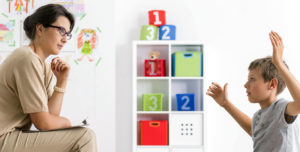Behavioral Therapy for Children with CP
Children born with cerebral palsy may suffer from low self-esteem due to the fact that they always seem to be lagging behind when compared to other kids their age. In addition, their physical disabilities may negatively paint their self-perception, making them feel like they are less than others.

Behavioral Therapy for Kids with CP
Behavioral therapy seeks to address these and other issues, helping these children live life to its fullest, regardless of their handicap.
Cognitive behavioral therapy can help teach children new ways of coping with certain difficulties or frustrations, as well as help promote positive encouragement. Behavioral therapy can be used to manage stressful situations that often lead to negative outcomes, and can also be helpful in addressing how to overcome life’s expected challenges.
Behavioral therapy is holistic and non-judgmental in nature, and focuses on the child’s strengths, abilities, and innate personality.
Self Esteem and Problem-Solving
Children born with cerebral palsy can develop dysfunctional ways of dealing with obstacles, especially if not addressed at a young age. They may get frustrated easily, snap at little things, revert to infantile behavior, and even become closed off to others.
This dysfunctional way of dealing with challenges and frustrations can start at a very young age, often as a result of being treated differently by their peers or being excluded from certain activities. Behavioral therapy involves finding out what makes a child with cerebral palsy tick, and working to overcome these challenges by re-learning how best to respond and/or cope.
By discovering the child’s interests and passions, a licensed behavioral therapist can use this to help them build a healthy sense of self-worth. In addition, therapists can engage them in play — as well as immerse them in real-life situations — to see how they react to difficult stimuli, and help teach them better ways of overcoming challenges.
Emotions, Anxiety, and Depression
Another aspect of behavioral therapy lies in the acknowledgement of a child’s emotions. Past trauma may form an unconscious barrier between the child and their peers or strangers, which may cause them to self sabotage or shy away from meeting new people. This can hold them back, and may lead to isolation and depression later in life.
Therapists will work on changing this behavior by letting them verbalize their emotions within a safe space, while also teaching them how to cope with such issues in a more-positive way.
Behavioral therapy also involves helping a child deal with anxiety and mood disorders in a more-constructive manner. This can be through the teaching of meditation and mindfulness to the child, on-the-spot tricks they can do to lower their anxiety at any given time, as well as long-term goals to help them overcome emotional obstacles.
Behavioral therapy will also teach real-world skills such as time-management, patience, delayed gratification, as well as productive socialization and etiquette. At the end of the day, the goal is to bring out the best in these individuals so that they can live independent and productive lives once they reach adulthood.
